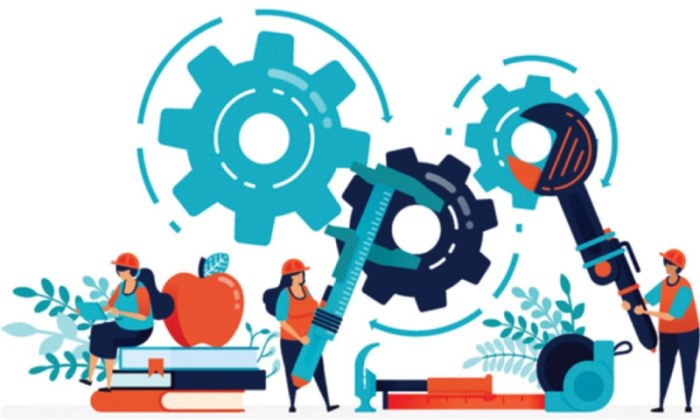
Vocational training careers offer a dynamic pathway for individuals seeking to enter the workforce with practical skills and knowledge. In today’s job market, alternative education routes like vocational training have gained significance, providing tailored programs that align closely with industry demands. With a variety of fields to explore—from business accounting to construction—these careers not only promise job readiness but also a chance to thrive in diverse sectors.
As vocational training continues to evolve, it presents numerous advantages over traditional college education, such as shorter program lengths, hands-on experience, and immediate job opportunities. This approach equips graduates with the specific skills employers seek, ensuring they are ready to meet the challenges of their chosen professions.
Overview of Vocational Training Careers
Vocational training careers have become increasingly significant in today’s job market, offering individuals practical skills and knowledge tailored to specific trades. As industries evolve and new job opportunities emerge, vocational training provides a viable alternative to traditional college education, equipping learners with hands-on experience and relevant competencies.Various vocational training programs are available across a wide range of fields, including business accounting, advertising, healthcare, and skilled trades.
These programs are designed to meet the specific needs of employers while preparing students for the workforce. The benefits of pursuing vocational training over a traditional college education include lower costs, shorter program durations, and a direct path to employment in high-demand industries.
Business Accounting
To become a certified business accountant through vocational training, individuals typically need to complete a program that covers essential accounting principles and practices. After obtaining the necessary education, aspiring accountants may pass certification exams such as the CPA (Certified Public Accountant) to enhance their credentials. Essential skills required for success in business accounting careers include proficiency in financial analysis, attention to detail, strong mathematical abilities, and familiarity with accounting software.
Common job roles in this field encompass:
- Certified Public Accountant (CPA)
- Management Accountant
- Financial Analyst
- Tax Advisor
- Auditor
Accounting Payroll
Payroll functions are crucial in any business setting, ensuring that employees are compensated accurately and on time. This includes calculating hours worked, deductions, and taxes, which are vital for maintaining employee satisfaction and compliance with laws.Vocational training programs specifically for payroll accounting focus on topics such as payroll laws, tax compliance, and payroll processing systems. Common software tools utilized in payroll accounting include QuickBooks, ADP, and Paychex, which streamline the payroll process and enhance efficiency.
Business Advertising
Vocational training options for careers in business advertising cover a range of skills, from creative design to strategic marketing. Programs often include lessons on consumer behavior, digital marketing trends, and campaign management, all essential for success in this vibrant industry.Successful advertising strategies learned through vocational training often emphasize the importance of targeting and engaging specific audiences through various media. Career paths in business advertising can include roles such as:
- Advertising Manager
- Media Buyer
- Copywriter
- Graphic Designer
- Social Media Specialist
Business Agriculture
Vocational training plays a vital role in modern agricultural practices, equipping individuals with the necessary skills to thrive in the industry. Programs focus on sustainable practices, farm management, and agricultural technology, preparing students for various career opportunities.Career opportunities within agricultural business sectors include roles such as:
- Agricultural Manager
- Agronomy Consultant
- Farm Equipment Operator
- Supply Chain Coordinator
- Soil and Crop Scientist
Vocational programs focused on sustainable agriculture teach techniques that promote environmental stewardship while ensuring economic viability in farming.
Architecture and Interior Design
A career in architecture requires specific vocational training that covers design principles, building codes, and project management. Students engage in hands-on projects that enhance their practical skills while learning theoretical concepts.Trends in interior design taught through vocational programs often include sustainable design practices, space optimization, and the integration of technology in design. Graduates of architecture and interior design programs can pursue job prospects in various roles such as:
- Architectural Designer
- Interior Decorator
- Urban Planner
- Landscape Architect
Business Branding
Branding is essential in business, and vocational training supports this by teaching students the fundamentals of brand strategy and development. Effective branding techniques covered in vocational programs include market research, logo design, and the creation of brand messaging.Career options available for branding specialists include:
- Brand Manager
- Marketing Consultant
- Creative Director
- Public Relations Specialist
Business Travel
Vocational training plays a critical role in shaping careers in travel management. Students learn about the travel industry, customer service excellence, and itinerary planning, all of which are vital for success.Essential skills for business travel management include strong organizational abilities, attention to detail, and effective communication, ensuring that clients receive the best travel experiences possible.
Career Advice
Choosing the right vocational training program can significantly impact individual career goals. It is essential for students to consider their interests, strengths, and the job market when making their decision.Vocational training can enhance job readiness and employability by providing practical experience and skills relevant to industry needs. Networking within vocational training communities is also crucial, as it opens doors to job opportunities and mentorship.
Careers Employment
Vocational training has a profound impact on employment opportunities, often leading to higher job placement rates compared to traditional education. Employers frequently seek specific skills that vocational training graduates possess, making them attractive candidates in the job market.A comparison of vocational training outcomes versus traditional education outcomes shows that vocational training often results in faster entry into the workforce and higher starting salaries in many fields.
Change Management
Vocational training is integral to change management processes within organizations. Programs teach students about the strategies needed to implement change effectively and navigate the complexities that come with it.Case studies of successful change management strategies provide insight into real-world applications that can enhance workplace adaptability and resilience.
Construction Industry

Various vocational training programs in the construction industry prepare individuals for a wide range of roles, from carpentry to project management. Safety training is a critical component, ensuring that workers are equipped to handle hazards on-site.Specialized roles within the construction field include:
- Construction Manager
- Civil Engineer
- Electrician
- Plumber
Business Consulting
Vocational training pathways in business consulting provide a comprehensive overview of the consulting industry, covering essential skills such as analytical thinking, communication, and problem-solving.Aspiring business consultants must develop a strong foundation in various knowledge areas, including market analysis and strategic planning, to thrive in this competitive field.
Continuity Disaster Recovery
Training in continuity and disaster recovery planning is essential for organizations seeking to mitigate risks and ensure operational resilience. Vocational programs teach critical skills related to risk assessment and emergency response strategies.Potential career paths in disaster recovery and continuity planning include roles such as:
- Disaster Recovery Planner
- Business Continuity Manager
- Risk Management Consultant
Customer Service
Vocational training plays a significant role in achieving customer service excellence by equipping individuals with the skills necessary to meet clients’ needs effectively. Customer service training programs often cover topics such as conflict resolution, communication skills, and customer relationship management, ensuring representatives can provide exceptional service.
Entrepreneurialism
Vocational training fosters entrepreneurial skills by teaching essential elements of business planning and management. This equips individuals with the knowledge to launch their ventures successfully.Real-world examples of successful entrepreneurs from vocational training backgrounds illustrate the potential for innovation and leadership within this space.
Business Ethics
Ethics in business is significant, and vocational training incorporates this critical aspect into its curriculum. Case studies highlighting ethical dilemmas expose students to real-world challenges faced in various business scenarios.Best practices for ethical business conduct are emphasized, ensuring that students understand the importance of integrity and accountability in their professional lives.
Business Franchising
Vocational training offers various opportunities for individuals interested in franchising by covering essential franchise management skills and operational strategies.Legal considerations for aspiring franchise owners are also discussed, providing a comprehensive understanding of the franchising landscape.
Furnishings and Supplies
Vocational training options for careers in furnishings and supplies management focus on inventory control, supplier relations, and product knowledge essential for success in this sector.Trends in the furnishings industry, such as sustainable materials and design innovations, are integrated into vocational programs, ensuring students are prepared for the evolving market.
Human Resources

The significance of vocational training in human resources management lies in its ability to equip individuals with the skills necessary for effective recruitment and talent management.Essential skills covered in HR vocational education include interpersonal communication, performance management, and conflict resolution strategies, preparing students for roles in diverse workplaces.
Industrial Mechanical
Vocational training for careers in industrial mechanics covers essential topics such as machinery operation, maintenance, and repair. Students learn hands-on skills needed to work in various settings, from manufacturing plants to technical service roles.Job roles and responsibilities within industrial mechanical fields may include:
- Maintenance Technician
- Mechanical Engineer
- Quality Control Inspector
Advancements in technology impact industrial mechanical training programs, ensuring that students are up-to-date with the latest tools and techniques used in the industry.
Wrap-Up
In conclusion, vocational training careers are a vital part of the modern employment landscape, providing individuals with the tools they need to succeed. As industries continue to evolve, those who pursue vocational training can expect to find rewarding opportunities that align with their skills and passions. Embracing this pathway not only enhances job readiness but also opens doors to fulfilling careers across various sectors.
Popular Questions
What are vocational training careers?
Vocational training careers are professions that require specialized training and skills, often gained through vocational programs rather than traditional college education.
How does vocational training differ from traditional education?
Vocational training focuses on practical skills and hands-on experience specific to a trade or profession, while traditional education often emphasizes theoretical knowledge.
What types of vocational training programs are available?
There are many vocational training programs available across various fields, including business, healthcare, construction, and technology, each tailored to meet industry needs.
How can I choose the right vocational training program?
Consider your career goals, interests, and the job market demand in your area. Research programs that offer relevant skills and have good job placement rates.
What are the benefits of pursuing vocational training?
Benefits include shorter program lengths, lower costs, direct connection to job opportunities, and targeted skills training that enhances employability.





